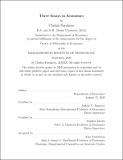Three essays in economics
Author(s)
Furukawa, Chishio.
Download1227088268-MIT.pdf (2.808Mb)
Other Contributors
Massachusetts Institute of Technology. Department of Economics.
Advisor
Abhijit V. Banerjee and Stephen Morris.
Terms of use
Metadata
Show full item recordAbstract
This thesis consists of three essays on diverse topics but shared emphasis on statistical models with theory and empirics. The first and third essay examines the role of cognitive limitations in understanding biases in communication and learning. The second essay, joint with Masao Fukui, highlights the role of distributional assumptions of infection rates for epidemiological predictions, responding to the recent COVID-19 outbreak. The first chapter considers the effects of aggregation frictions on scientific communication and shows that publication bias emerges even when researchers are unbiased and communicate their findings optimally for readers. Specifically, when readers are cognitively constrained, they may only consider the binary conclusions rather than the estimates of the papers. Under such aggregation frictions of readers, researchers are shown to omit noisy null results and inflate marginal results. This chapter presents evidence consistent with this prediction, and develops a new bias correction method, called stem-based correction method, that is robust under the prediction of this and other models of publication selection processes. The second chapter examines the role of infection rate distributions for aggregate epidemiological dynamics in Susceptible-Infectious-Recovered (SIR) models. Specifically, we show that superspreading events (SSEs) of recent coronavirus outbreaks, including SARS, MERS, and COVID-19, follow a power law distribution with fat tails, or infinite variance. When embedding this distribution to stochastic SIR models, we find that idiosyncratic variations in SSEs generate important uncertainties in aggregate epidemiological dynamics. This result stands in contrast with the existing literature on stochastic SIR models that have assumed thin tailed distributions, and thus concluded that the idiosyncratic uncertainties are unimportant when the population is large. The third chapter considers the impact of imperfect recall on experimentation decisions and resulting inferences. When a Bayesian experimenter has an imperfect recall over past actions and information, her decisions depend not only on a confidence level but also on the expectation the future self will hold for today's action. This expectation arises from the persistent prior belief, and leads to the biases to conform to it. Meditation, to regulate one's attention with focus on the present, is shown to have an ameliorating effect: when the attention is focused, prior belief becomes essentially diffused so that the self-imposed expectation over behaviors becomes agnostic.
Description
Thesis: Ph. D., Massachusetts Institute of Technology, Department of Economics, September, 2020 Cataloged from student-submitted PDF of thesis. Includes bibliographical references.
Date issued
2020Department
Massachusetts Institute of Technology. Department of EconomicsPublisher
Massachusetts Institute of Technology
Keywords
Economics.